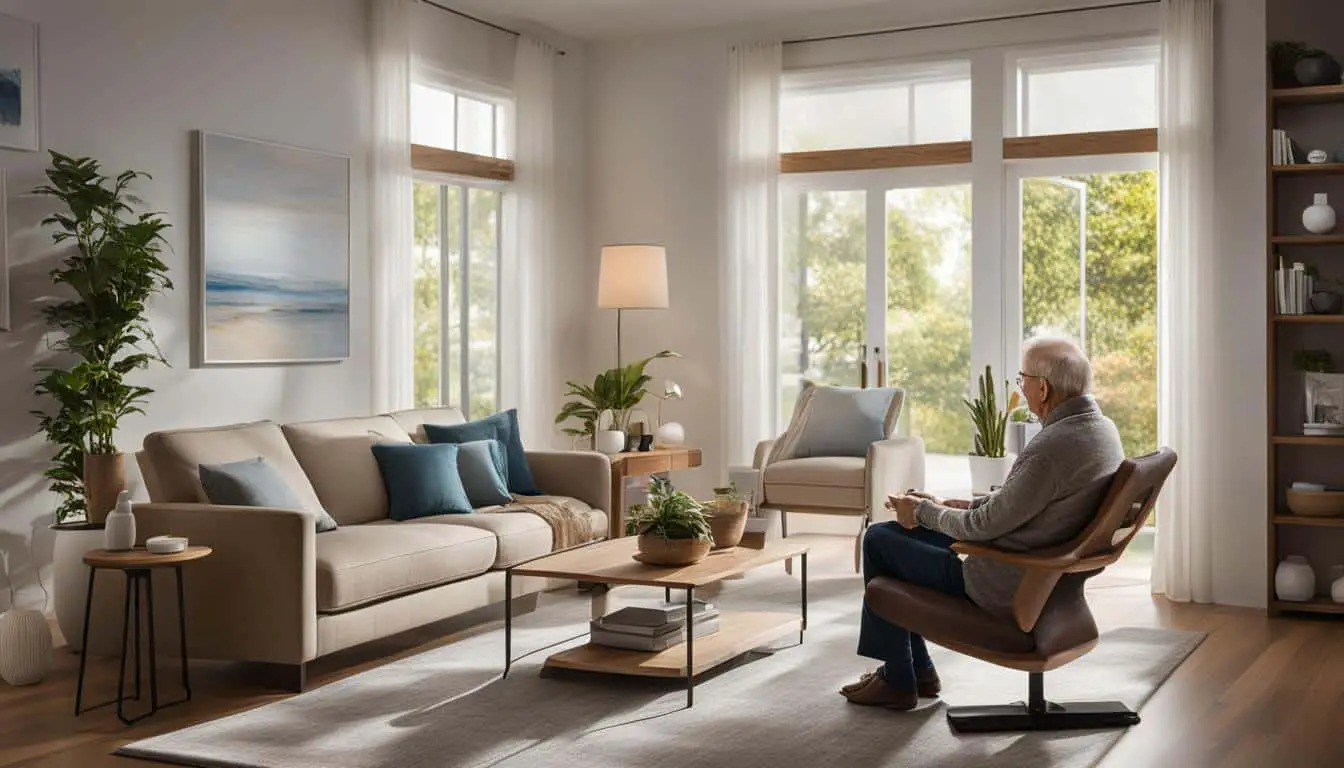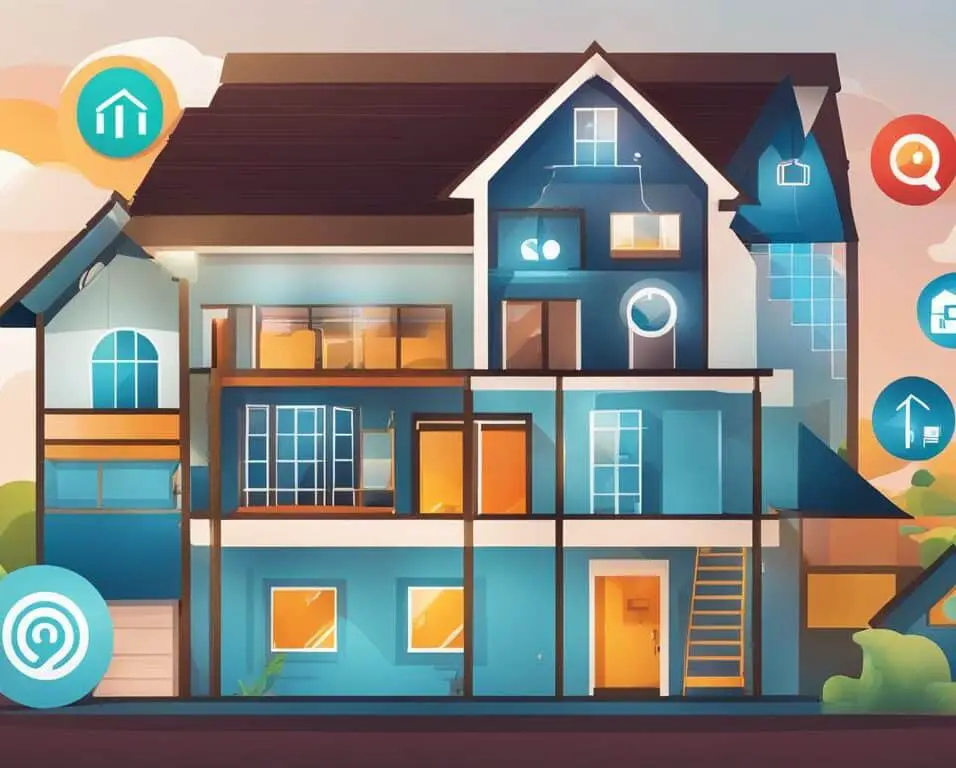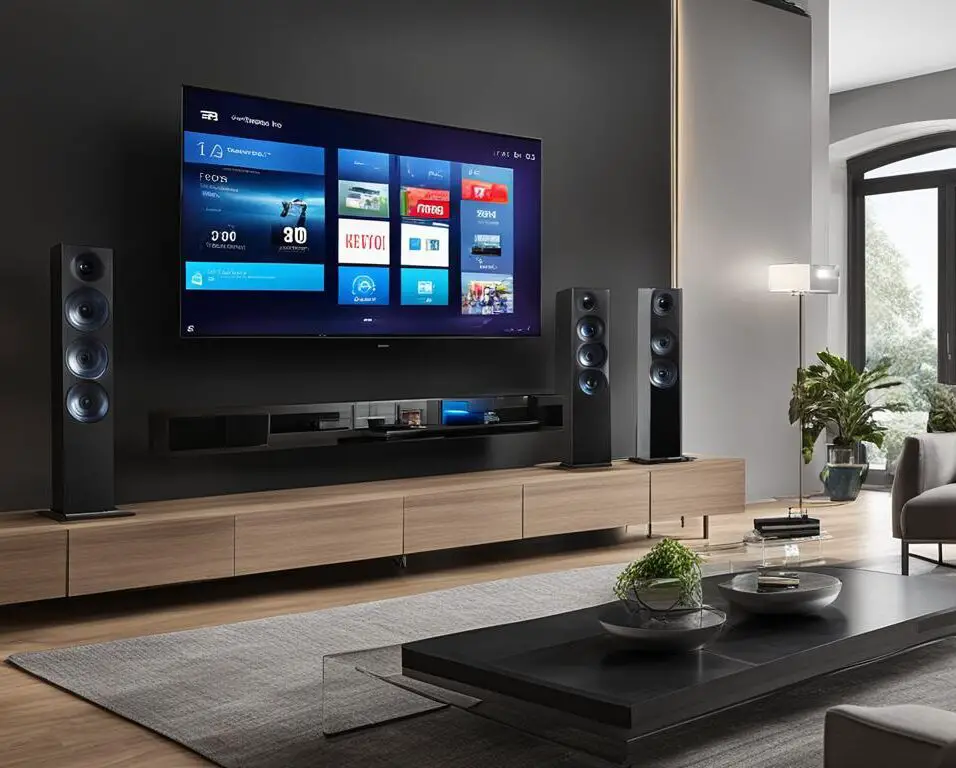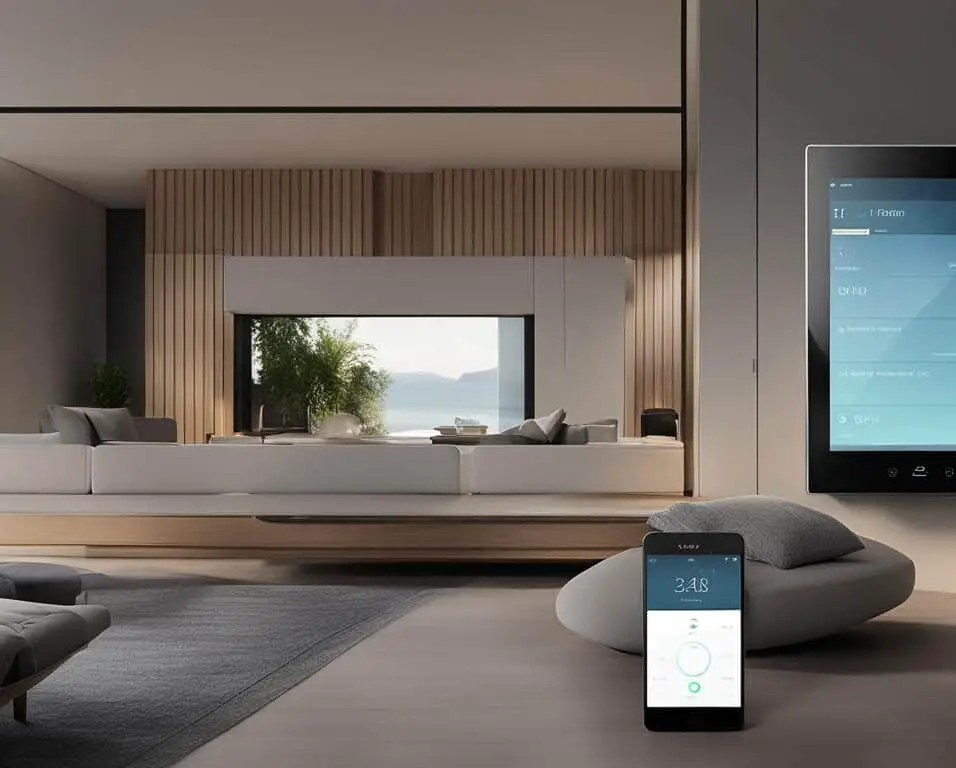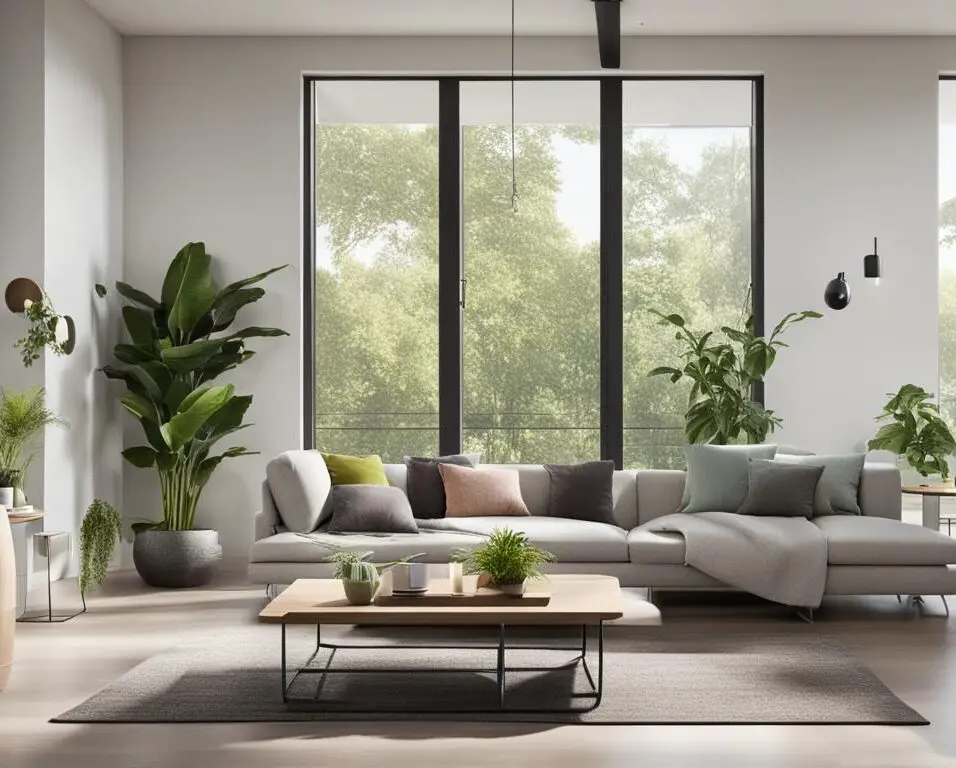Smart Home Tech for the Elderly: Improving Accessibility
Smart home technology has revolutionized the way we live, and its benefits extend far beyond convenience and security. For the elderly and individuals with disabilities, these advancements have opened up a world of possibilities to improve accessibility and enhance their quality of life.
When considering smart home devices for the elderly, it is essential to understand their unique needs and preferences. Factors such as ease of use, budget, and installation requirements should be carefully evaluated to ensure the right choices are made.
Key Takeaways:
- Smart home technology offers a range of options to improve accessibility for the elderly.
- Assess individual needs, ease of use, budget, and installation requirements before selecting smart devices.
- Popular smart home devices for the elderly include smart light bulbs, hubs, robot vacuums, video doorbells, and smart locks.
- Ongoing research aims to develop personalized healthcare solutions and enhance the capabilities of smart home technology for elderly care.
- Embracing future advancements in AI, IoT, and wearable devices can support the well-being and independence of the aging population.
Popular Smart Home Devices for Elderly Living
Smart home technology has revolutionized the way we live, and it has brought significant benefits to the elderly population. With aging in place technology becoming more accessible and user-friendly, seniors can enjoy greater independence and convenience in their daily lives. In this section, we will explore some of the most popular smart home devices that cater to the unique needs of the aging population.
Smart Light Bulbs
Smart light bulbs are a simple yet effective addition to any elderly person’s home. These bulbs can be easily controlled through smartphone apps or voice assistants, allowing seniors to adjust the brightness and color temperature to suit their preferences. With programmable scheduling features, smart light bulbs can automatically turn on or off at specific times, providing enhanced visibility and safety.
Smart Hubs
Smart hubs serve as the central control unit for all smart devices in a home. They enable seamless integration and management of various devices, such as smart lights, thermostats, and security systems. With intuitive interfaces and voice command capabilities, smart hubs make it easy for elderly individuals to operate their smart home devices with minimal effort.
Robot Vacuums
Keeping the house clean can be challenging for seniors, especially those with limited mobility. Robot vacuums address this issue by autonomously navigating through the home and cleaning the floors. These devices reduce the physical strain of manual vacuuming and allow seniors to maintain a clean living environment effortlessly.
Video Doorbells
Video doorbells provide an added layer of security and convenience for elderly individuals living alone. With a video doorbell, seniors can see and communicate with visitors remotely through their smartphones. This feature eliminates the need to physically approach the door, enhancing safety and peace of mind.
Smart Locks
Smart locks offer keyless entry and advanced security features for elderly individuals. With smart locks, seniors can unlock their doors with a smartphone or a unique access code, eliminating the need for physical keys. This feature can be particularly helpful for individuals with mobility issues or those prone to misplacing keys.
Table: Comparison of Popular Smart Home Devices for Elderly Living
| Smart Home Device | Benefits | Considerations |
|---|---|---|
| Smart Light Bulbs | – Enhanced visibility and safety – Customizable lighting settings |
– Requires a reliable internet connection – Initial setup and installation |
| Smart Hubs | – Centralized control of smart devices – Voice-controlled operation |
– Compatibility with other smart devices – Learning curve for initial setup |
| Robot Vacuums | – Automated floor cleaning – Reduces physical strain |
– May not be suitable for all floor types – Initial cost of the device |
| Video Doorbells | – Remote communication with visitors – Enhanced home security |
– Requires a stable internet connection – Smartphone ownership |
| Smart Locks | – Keyless entry and convenience – Advanced security features |
– Compatibility with existing doors – Proper installation and setup |
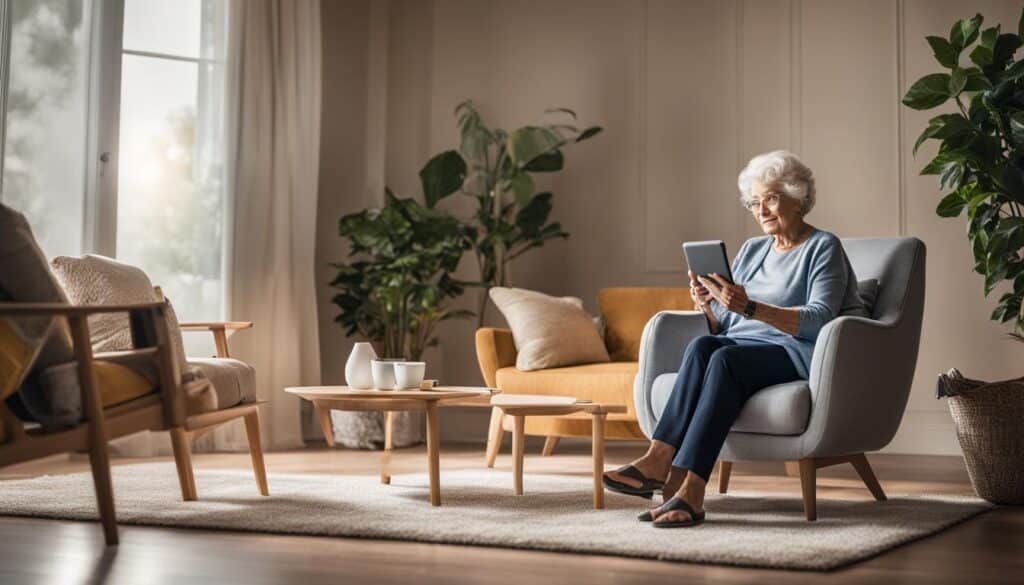
By incorporating these popular smart home devices into their living spaces, elderly individuals can experience improved safety, accessibility, and overall quality of life. It is important to carefully consider individual needs and preferences when selecting these devices, ensuring that they meet specific requirements for aging in place. With ongoing advancements in smart home technology, the possibilities for enhancing elderly independent living are continuously expanding.
The Future of Smart Home Technology for Aging in Place
The field of smart home technology for elderly care is evolving rapidly, paving the way for a future where aging individuals can live independently and comfortably. Ongoing research is dedicated to developing innovative solutions that cater to the unique needs of the elderly population, combining ambient intelligent domotics with personalized healthcare. These advancements aim to manage declines in intrinsic capacity, promote aging in place, and improve overall well-being.
Design principles for elderly-friendly smart home devices emphasize the importance of creating pleasurable experiences and user-centered designs. By integrating smart technologies seamlessly into the home environment, elderly individuals can experience enhanced accessibility, convenience, and safety. From voice-activated assistants to fall detection sensors, these devices are designed to meet the specific challenges faced by seniors, ensuring their quality of life remains high and their independence is maintained.
The future of smart home technology for aging in place holds great potential through the integration of artificial intelligence, the Internet of Things (IoT), and wearable devices. These advancements will enable more sophisticated monitoring and support systems, allowing care providers and families to remotely track health metrics and ensure the well-being of their loved ones. By embracing these technologies, society can foster a more inclusive and supportive environment for the aging population.
In summary, the future of smart home technology for the elderly is bright, with ongoing research and advancements paving the way for improved care and independence. From ambient intelligent domotics to personalized healthcare solutions, these developments will revolutionize how we support the well-being of aging individuals. By prioritizing user-centered design and staying at the forefront of technological advancements, we can create a future where elderly individuals can age in place with dignity, safety, and comfort.
FAQ
What are some popular smart home devices for the elderly?
Popular smart home devices for the elderly include smart light bulbs, smart hubs, robot vacuums, video doorbells, and smart locks.
How can smart light bulbs benefit elderly individuals?
Smart light bulbs can be programmed for scheduled lighting, providing enhanced visibility and safety.
What is the function of a smart hub in a smart home for the elderly?
A smart hub serves as the central control unit for all smart devices, allowing easy access and management.
How can robot vacuums assist elderly individuals?
Robot vacuums automate floor cleaning tasks, reducing physical strain and effort for elderly individuals.
What is the purpose of a video doorbell in a smart home for the elderly?
Video doorbells provide security and convenience by allowing individuals to see and communicate with visitors from their smartphones.
How can smart locks enhance safety and accessibility for the elderly?
Smart locks offer keyless entry and additional security features, making it easier for elderly individuals to enter and exit their homes.
How is smart home technology for the elderly advancing?
Ongoing research focuses on developing ambient intelligent domotics and personalized healthcare solutions that cater to the unique needs of the elderly population.
What design principles are emphasized in smart home technology for the elderly?
Design principles in smart home technology emphasize the importance of pleasurable experiences and user-centered design.
What future advancements can we expect in smart home technology for the elderly?
Future advancements in artificial intelligence, Internet of Things (IoT), and wearable devices are anticipated to further enhance the capabilities and applications of smart home technologies for elderly care.



